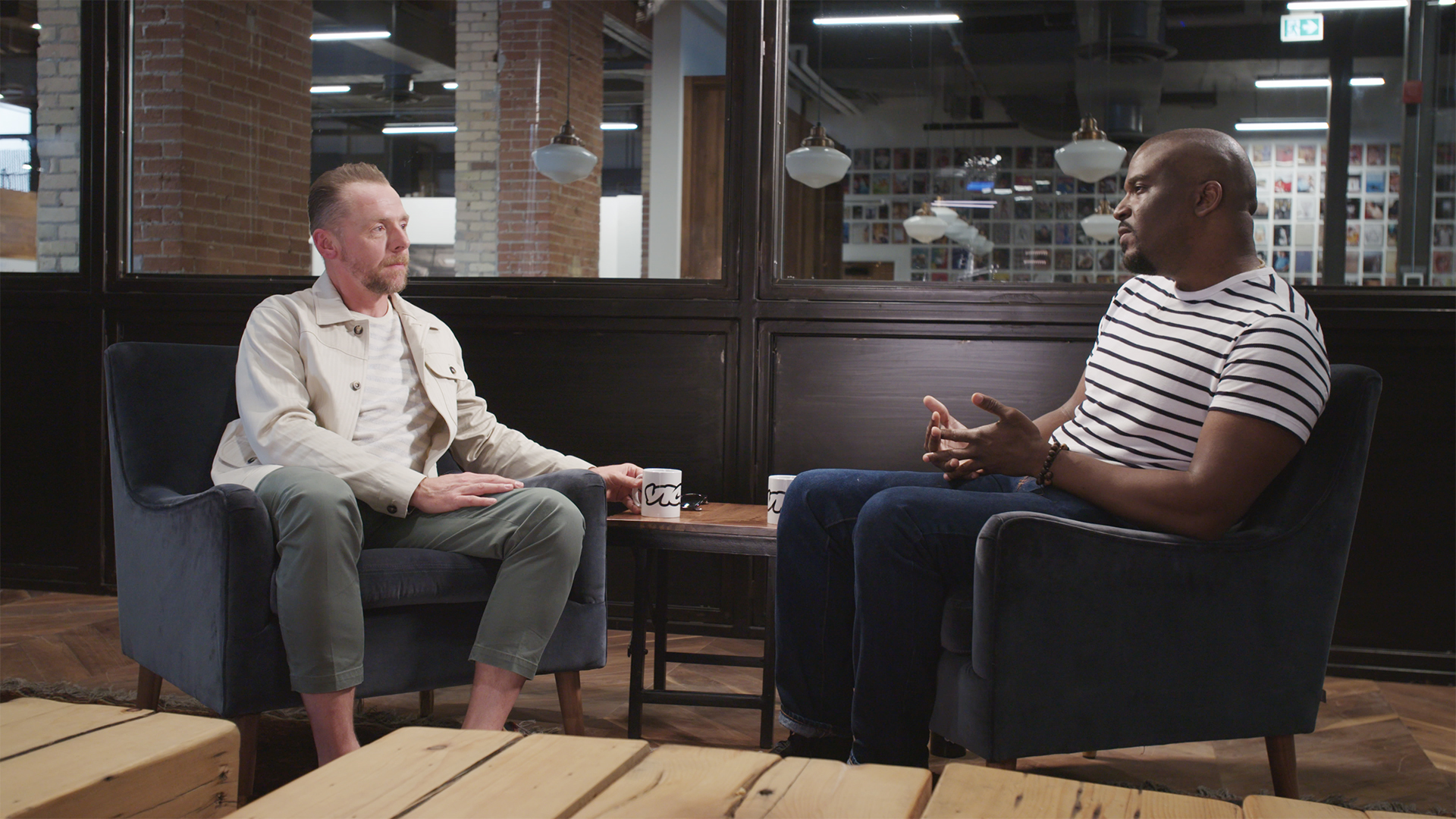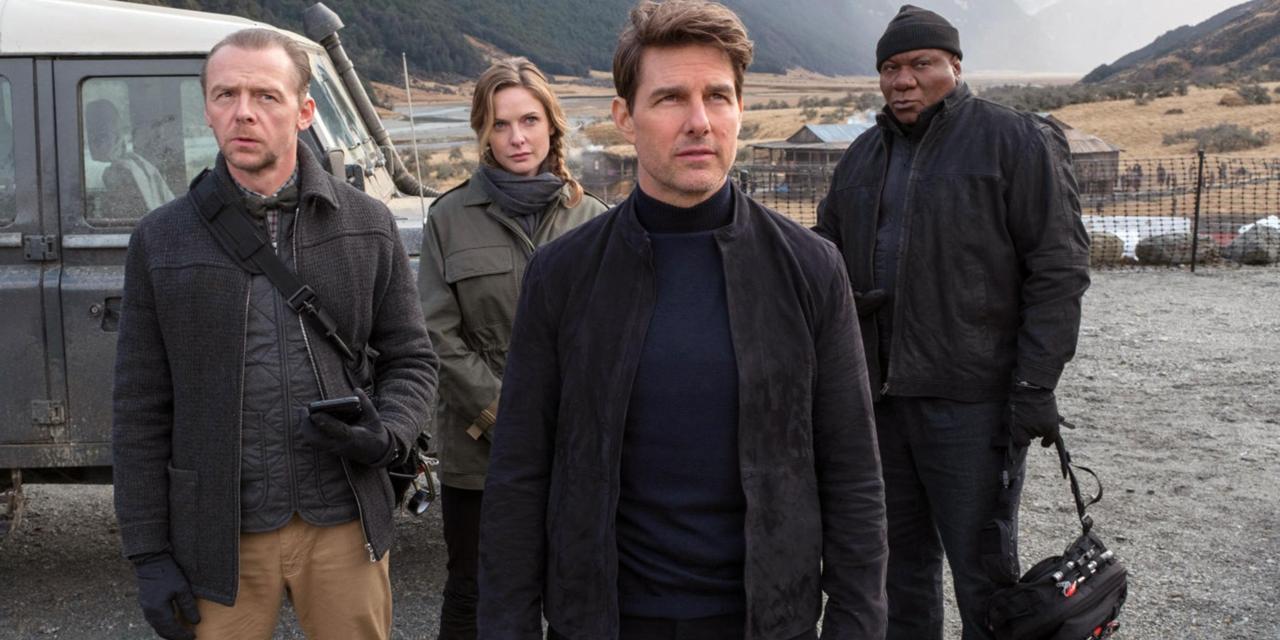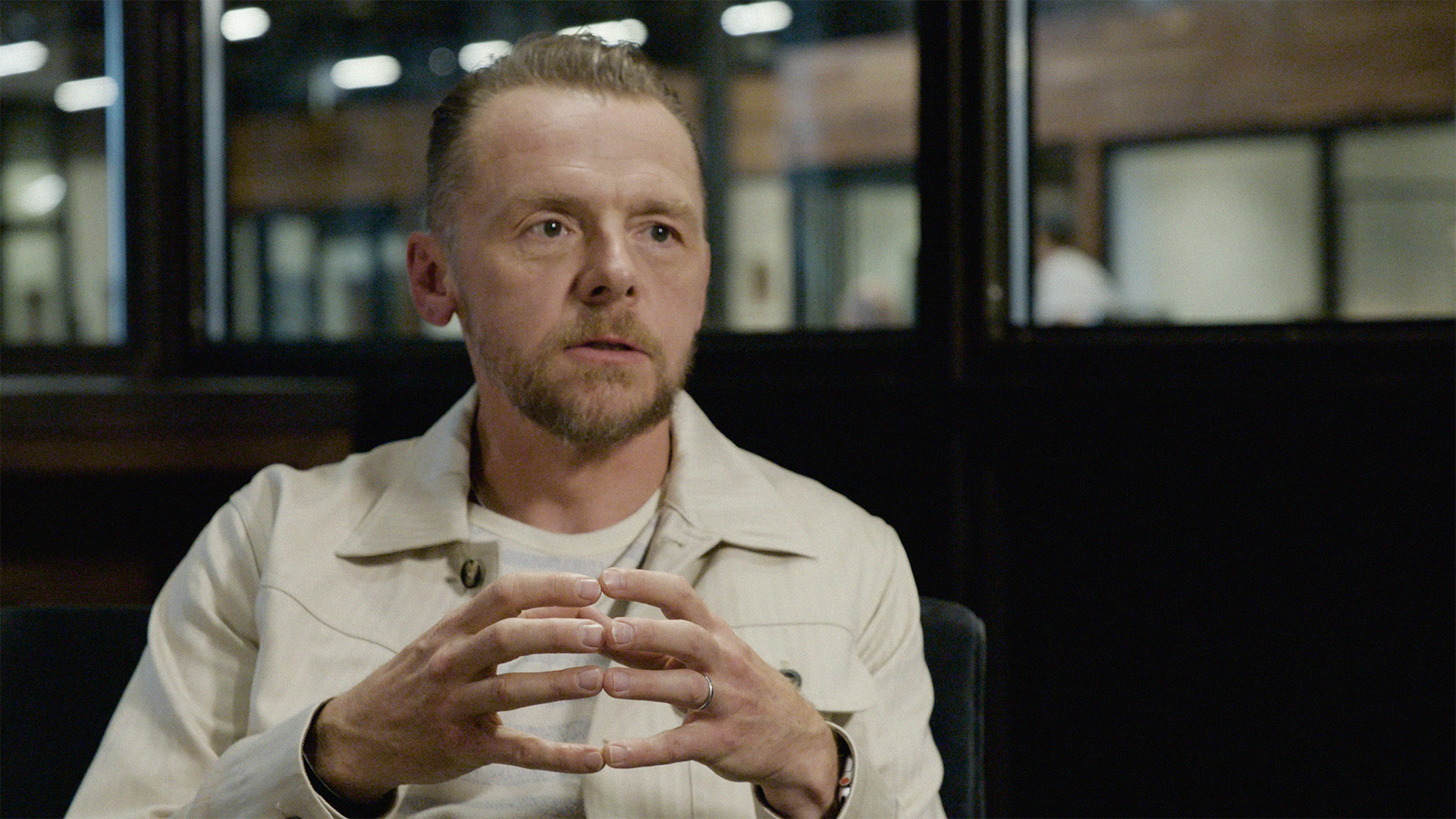Simon Pegg Doesn’t Want to Be Your Geek Boy Anymore
When I see Simon Pegg in-person, it puts a dent to the non-Hollywood, nerdy man next door label I’ve always viewed him as. He wears a white jean jacket with a black and white striped undershirt—fashionably casual.
I have to remind myself that this is the same guy who once described himself as a self-professed “geek boy.” I have to remember that he’s the same actor who got his start co-creating the cult UK TV series Spaced—a show about a twenty-something, pop-culture obsessed Tim Bisley and his roommate Daisy Steiner (Jessica Stevenson)—shooting the shit, getting high, and living through every pop-culture reference under the sun. And obviously, I gotta recall those Edgar Wright comedy classics (Shaun of the Dead, Hot Fuzz etc.) that cracked me up. But speaking in our Toronto office earlier this week, there was definitely a different vibe about him than I expected. He’s grown up.
“To be honest, I don’t feel as invested in all that nerdy stuff as much as I used to,” he reveals. “Maybe I’m just getting old, I don’t know.”
It’s all ironic when you think about Pegg’s career trajectory in light of the childhood passions that informed his pathway: His love for zombie movies, Doctor Who, Star Wars, Star Trek which all attached themselves to his cinematic resume and public image like an unremovable paste—the promotion of the latest Mission Impossible movie simply being an extension of that.
Set for a July 26 wide release, Simon Pegg is reprising his role as Benji Dunn, the IMF technician turned field agent who continues to assist Ethan Hunt (Tom Cruise) on completing a mission pitting the 56 year old agent against the CIA; all bundled with some standard assassin, former ally battling goodness. It’s getting rave reviews for knowing what is is—a so-dumb-it’s-smart action movie.
When we exchange words about the series in detail, I got the strong sense that Pegg, while grateful, is way past being a typecasted funny nerd for Hollywood. He’s more than that, as evident from his recent talks about his alcoholism and depression. How does he really want to be viewed? I sat down with him to talk about all that and more.

VICE: You’re continuing your role as as Benji, the tech guy from Mission Impossible III and in a lot of ways he’s basically you with a tech background. How much of his character is being shaped by you vs. the script?
Simon Pegg: I see Benji as a character who takes on the look of the audience whose going into this world of you know, high tech espionage, masks, and gadgets because he’s the most human part of the group. Ethan is the superhero, he’s very enigmatic and super equipped much like Ilsa Faust. Luther Stickell, Ving Rhames’ character is ultra cool, aloof and a little bit mysterious. Whereas Ben is the one who always has to say why we’re doing this. We might die, stupid. What’s wrong with you? Let’s kind of question this? It’s pretty much the same questions I’ve asked Tom when he did and thought of the things we’ve seen him do. That’s what makes Benji so relatable. I have to make him as human as I can. And invariably, that ends up being a little bit like me. I’m not like Benji. I’m nowhere near as able as him, or as deadly. People don’t realize that. I don’t know. Benji really comes out from his honesty. It’s not like he’s clean or that he cracks jokes all of the time. He’s not like Mr. you know, wacky, doodle dandy guy. He more sort of just speaks the truth. I think in situations of kind of heightened filmic tension, it’s funny when someone says, wait a minute (laughs) what are you talking about?
To be honest, I was feeling a little bit ill served when Benji was just sort of reduced to, oh you know, the comic relief. I don’t think I am, I think I’m the character who has levity but I also think the other characters equally bring humour to it all. Tom’s very funny in this one because he’s playing Ethan a little bit out of his comfort zone. He’s kind of a bit less assured as he usually is, and Tom is really good at playing vulnerable characters. Just look at Jerry Maguire or The Edge of Tomorrow where he’s playing someone who’s essentially a bit of a douchebag. He’s brilliant at that you know, because vulnerability is just something he does really well, even though he’s like the ultimate action man. For me, it’s just about trying to keep it real.

Is he becoming more fun of a character to play as time goes on?
Well, not exactly. When I first did Mission Impossible III, I thought it was a bit of JJ Abrams having seen Shaun of the Dead where he’s just like, “let’s get him to do a scene, it’ll be fun.” And it was. I know I was very thrilled to meet JJ but then I didn’t realize that I’d get to play this character four times and see him evolve from being a sort of a nerdy kind of land guy to this secret agent and it’s been fun through his first moments. He takes a life in his first mission and then gets into extreme jeopardy in a variety of ways, particularly in this one where he almost, or maybe kinda slightly, loses his life. So it’s always fun to play a character that’s grown on screen while having all these people see every facet of that growth from sort of an IT guy to a cold blooded killer.
Given that we’re talking about four years, besides the abs, what have you taken away as a result of playing Benji? I mean can you fix a computer, or are you better with tech at least?
(laughs) I’ve learned nothing, I mean maybe some knowledge…actually nope, not even that. I love tech, I’m a big fan of getting stuff but if they break I’m calling someone about it because I have absolutely no idea what goes on inside.
Do you still have the six pack at least?
I got maybe three of them (laughs). The thing is when you’re off season, you don’t have to be careful. When we’re on, we’re training so hard to be on mission. Every day it’s nice to have that excuse to train hard. But the hardest thing I’ll say about keeping fit and all that, even though there’s sort of pressure on us to do so anyway in some respects, is finding the time to do it. We all have busy schedules and work hard. It’s just difficult to set aside an hour to lift up heavy things. But whilst doing the mission thing, I’m on a very strict regime where we’re looked after nutritionally. It’s really easy to get into tip top condition that way, which is always nice, because in Mission Impossible III I looked like a jacket potato. (laughs) I did. And then in this one, I’m more sort of like a stick of celery or some sort of flat vegetable.

When you’re playing new characters or recurring characters like in the case of Benji, what are you then tapping into when it comes to that comedic side.
You know, I don’t know. I’ve kind of been typecasted really because I started in comedy. I never planned to be a comedic actor at all and I’m almost slightly pissed when I see myself referred to as a comedian. I’m not. I haven’t been a comedian for 25 years. Sure, I did start as a stand-up comic because I was training to be an actor and thought, I don’t want to wait around for the phone to ring the whole time. I’d rather get out there and do some stuff and stand up was a great way of performing. That was my route back into acting. And the first things I did just happened to be comedies. I was a fan of the genre and it wasn’t anything I was forced into either as I do love comedy.
But you know, my big ambition when I was 16 was to be at the Royal Shakespeare Company in Stratford, England and do Shakespeare. I certainly value the idea of dramatic acting because me and Edgar Wright always made sure our films had a vein of that. There’s nothing funny about having to shoot your mom when she’s turned into a zombie. It does kinda sound funny when I say that, but in that scene in the movie, the idea was to play on that for real with the tragedy of that. It was similar for The World’s End, which was about a suicidal alcoholic. Nothing about that is funny.
So what sort of roles are you looking to play moving forward then?
Oh, I don’t know. It’s hard, and I don’t want to sound ungrateful for the stuff I’ve done which I’m very proud of and love. I just want to keep some variety in my work. For instance, I just made a movie in LA called Lost Transmissions which is about a schizophrenic guy who comes off his medication and has a break, he’s (in) LA, and ultimately becomes homeless. It’s easy for that to happen in the US because of the way the healthcare system works. You can go from being a perfectly normal human being to being on the streets very quickly, and that was a dramatic role and I really relished doing that. It felt different in its change of pace.
Well let me ask, how is your belief system dictating the roles you want to play then. You’ve supported certain causes and you just mentioned a role surrounding schizophrenia. You’re obviously a more mature individual as I don’t imagine you’d wanna do another Spaced.
Oh no (laughs). Well Spaced was about a certain time in history and of our lives as well. I don’t think we could ever write Spaced now. I think we were quite relatable as people back then because we were 20-somethings living in shared accomodation, getting high all the time. I don’t even know where my shoes are anymore (laughs), no that’s not true. They’re in a special cupboard. But seriously, I think at this point in my life that make me happy. That’s the ultimate measure of success for me. My own happiness. So I can make a film and have it not turn out that well. But as long as I enjoyed the process of making the film, then I’m never going to regret it. I don’t regret anything that I’ve ever done because I’ve always enjoyed the process more than the product.
There’s too much made sometimes by artists or would be artists of the end result. That’s usually what you have at the end, a kind of echo of what’s taken place on the day during the time when you’ve been making it. That’s where my fulfilment comes from. From there you get a little souvenir at the end which serves as a record of it, whether it be a film, song or painting.
So you’re still having fun then. Because some folks would say that back in the day when you did TV shows like Spaced , you had a lot of creative freedom. The industry seemed fresh. With being involved with all these established franchises and worlds, are you still being creatively challenged?
That’s an interesting part of these sort of stories you know, particularly with something like Star Trek: Beyond, which I ended up co-writing the last time. That was a huge challenge because it was established and because we were given the ultimate train set in space and were told to go play with this for a bit. I mean that was insane and really enjoyable. I like the challenge and I think I’d just get bored quickly if I wasn’t. I mean with Mission Impossible: Fallout, we took a year to shoot it all in all for about 140 days of actual on the set shooting and that sometimes became a bit tiring because you’re just like “when are we going to finish this thing?” But the proof of the pudding is in the eating, it’s an odd phrase. When I ate the film, it was great.
What does that mean exactly?
Oh, we call dessert pudding, apple crumble. They’ll make the apple crumble but you wouldn’t know if it was a good apple crumble to buy. So when I watched the movie and finally took a bite of that big cinematic cruise crumble, I realized it was tasting nice…that’s the biggest, clumsiest metaphor ever.
I don’t want to trap you into a nerdy space, but want to shift to Star Wars a bit. We all know you’ve been a huge fan, so what’s your take on the current state of things. Has the series reached a peak?
Well, it can’t be at its peak because its peak will always be the beginning. It has one of the best sequels ever in The Empire Strikes back. It was the best doubling down of a story. The way it mutated slightly in tone to become more sophisticated in the way that it was directed deep in the characters was an extraordinary kind of double hit there. The first one which was beautiful and simple and clear and clean, it was morally just everything America needed at the time and it had this global effect. Then the second one came along and that was angsty and cool, and enter in the third one when you just began to get the diminishing returns a little bit. I love Return of the Jedi and I’m not a Return of the Jedi decrier. Some people in the wake of the prequels started to look back on it, like, ooh, they had Ewoks and stuff like that, but I don’t remember being in any way downhearted about that entry.
I get it though, they recycled the Death Star a little bit and we saw little Chewbacca making a Tarzan noise which was just a comedic misstep. And then the prequels came out and through Spaced, I ended up not liking them. And then I personally became representative of the Star Wars [prequels] descent which was uncomfortable generally because people did like them, and I was mad about them not being very good while others in fact did like them. From that, you got this sort of toxic back and forth which was tiring and I really regret getting into.
Well given the state of that franchise, if you were to give me an elevator pitch of your own Sci-fi series, what would it be?
Hmm, I have an idea, but I’m not telling you. I don’t want to pitch it because it’s actually real (laughs). To be honest, I don’t feel as invested in all that nerdy stuff as much as I used to. Maybe I’m just getting old, I don’t know. I was definitely in my 20s when I’d hoover up everything. I’m just not bothered anymore.
So you’re just past the whole sci-fi nerdy thing?
Yeah. I like Handmaid’s Tale, Westworld, that kind of sci-fi. The whiz and bang stuff are things I just find less appealing these days.
Follow Noel Ransome on Twitter.
Sign up for the VICE Canada Newsletter to get the best of VICE Canada delivered to your inbox.